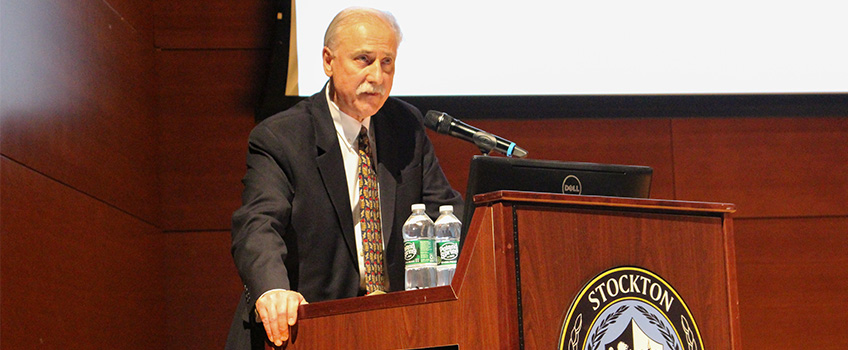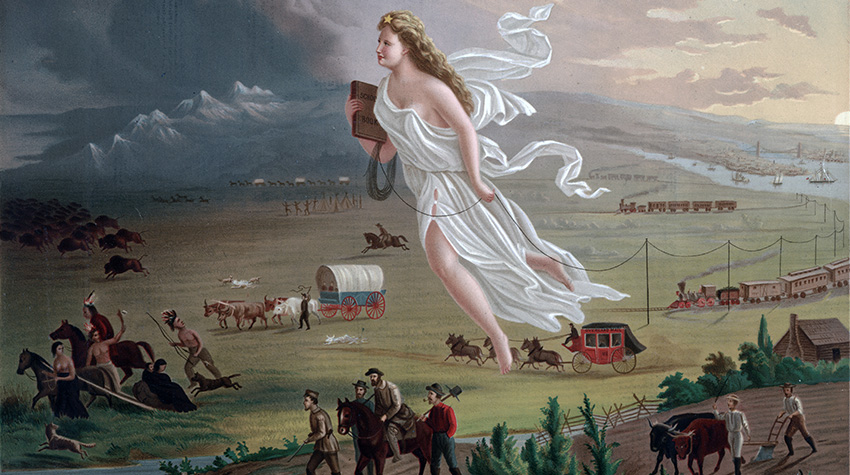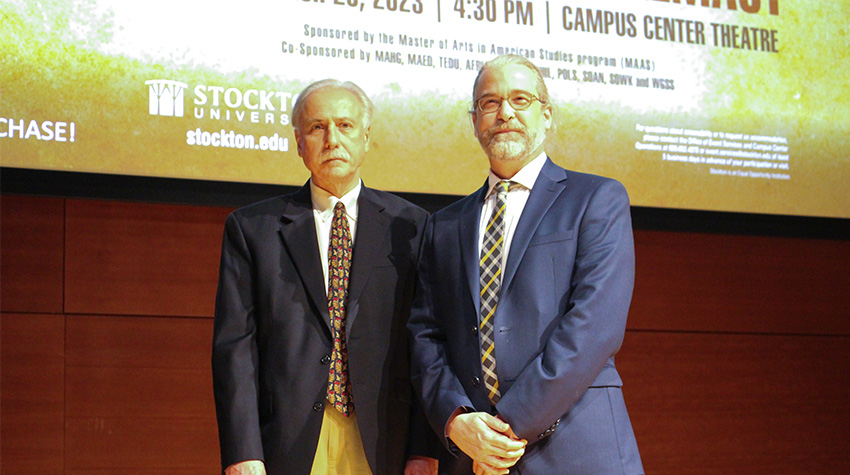Author Discusses the Legacy of White Supremacy in Education

Donald Yacovone was the 13th Paul Lyons Memorial Lecture speaker on March 28, 2023.
“Paul was among the founders of the American Studies graduate program, and our program reflects his vision of interdisciplinary public engagement with the arts, humanities and social sciences... Today, we continue the scholarly, social and educational mission of our predecessors by hosting this series."John O'Hara, chair of the Master of Arts in American Studies
Galloway, N.J. — “Today is so much a product of yesterday that yesterday can only be understood as it is explained by today… For the present is simply the developing past, the past is the undeveloped present.”
Donald Yacovone, the guest lecturer for the 13th annual Paul Lyons Memorial Lecture, began his presentation with a quote by American historian Frederick Jackson Turner on March 28 in the Campus Center Theatre.
Yacovone is a lifetime fellow for the Hutchins Center for African American Research located at Harvard University. He is also a winner (along with Henry Louis Gates, Jr.) of the NAACP’s 2014 Image Award for their six-part documentary series, “The African-Americans: Many Rivers to Cross.”
His talk was adapted from his book, “Teaching White Supremacy: America’s Democratic Ordeal and the Forging of Our National Identity,” which has been nominated for a 2022 Los Angeles Times Book Prize in History.
White Supremacy as National Identity
The author wrote his book to examine the history of white supremacy and how it has been taught through American history textbooks. Before talking about the current climate surrounding African-American education in schools, Yacovone, using a quote by prominent author James Baldwin, urged students to look back to history to understand what is happening today.
“James Baldwin’s observation of 1963 remained as true now as it did in his own lifetime,” Yacovone said. “’Such Americans are, in effect, still trapped within a history that they do not understand, and until they understand it, they cannot be released from it.’ Creating such an understanding, then and now, is a challenge, but Baldwin did indeed, however, identify the issue at stake in our ongoing American crisis: ‘The danger in the minds of most white Americans is the loss of their identity. They understand (the end of white supremacy) as an assault of one’s identity.’”
According to Yacovone, this feeling of losing one’s sense of American identity from the resistance of white supremacist thinking isn’t a reflection of one’s desire to be a white supremacist. Rather, it’s a demonstration of the indoctrination that students undergo when interacting with history in education. Through his research of more than 3,000 American history textbooks, he has seen “the origins, development and perpetuation of the idea of national identity as white from the colonial period to the present.”

Never before, or since, has any American more graphicly unified national identity with white supremacy in education."Donald Yacovone, author of "Teaching White Supremacy"
Simply put, white supremacist thinking has been ingrained in the foundation of America and its identity, making it extremely difficult to even see and understand, let alone eradicate, from curriculums across the U.S. To demonstrate this, Yacovone pointed to a famous lithograph of a painting by John Gast from 1872 called “American Progress.”
The painting prominently features Columbia, who signifies America, leading people into the West. As she carries telegraph wires in her left hand, she casts out Indigenous Americans and their buffalo into the dark to make room for colonialists, trains and horse carriages. To Yacovone though, the most important part of this painting is its inclusion of Columbia holding “the emblem of education, a school/textbook” in her right hand as she floats above the slowly changing landscape.
“Never before, or since, has any American more graphicly unified national identity with white supremacy in education,” Yacovone said. “It illustrates the cherished past that is rapidly becoming unhinged.”
Why History is Reinterpreted Through Education
Most surprisingly, however, are the roots of the disinformation campaigns in history books that claim the subjugation of Africans and Indigenous Americans as “necessary ills” for the good of the new nation and frequently overlook and render invisible the lives and accomplishments of nonwhite Americans. According to Yacovone, this was the work of the seemingly progressive Northerners rather than the embittered South.
He claims that the need for unity after the Civil War prompted both sides to turn to white supremacist thinking to move on from the conflict that almost tore the United States in half. It was the Northern side that rewrote history in the name of this unity.
“Of course, Southern slaveholders and their descendants have a unique and lethal responsibility for Civil War and racial oppression, but even if slaves had never existed in the South, Northern religious leaders, intellectuals, writers, politicians, scientists, educators and lawyers would have invented a lesser race — which is exactly what happened — to build white democratic solidarity and, in that way, make democratic culture and political institutions possible,” Yacovone said. “American democracy depended upon Black/racial inequality to sustain white equality.”
As the nation healed from the War during Reconstruction, history was skewed in favor of white European settlers, while newly freed African Americans and displaced Indigenous Americans were quickly written into side characters and “burdens” for the “real Americans” who civilized them through colonization. Knowing this history, Yacovone implores that broader society pays attention to the legacy of white supremacy and how it impacts our nation’s memory of that time.
The assumption of white identity, white domination and white importance underlined every chapter and theme of the thousands of textbooks that blanketed the schools of our country. This vast tectonic plate still underlies American culture today and must be a central concern for every single one of us. While the very worst features of our textbook legacies may have ended, the themes, facts and attitudes of white supremacist ideologies are deeply embedded in our national identity, what we teach and what we read.”
The Impact of Disinformation
Later, Yacovone switched gears to discuss the present-day “curricular violence” in today’s public education system, including how various American history classrooms across the U.S. had Black students participate in mock slave auctions for their white peers and were even threatened with violence if they didn’t want to participate. In one such incident in Ohio, a parent complained, and the teacher simply said the mock auction was a part of the state’s curriculum plan and that it was required for them to do despite the emotional harm that the Black students suffered from after.
“Despite 60 years of dedicated modern scholarship, the long and heroic Civil Rights Movement and endless social and political commentary, in too many painful ways, little has changed since the African-American scholar Charles Wesley surveyed history in the school curriculum in 1925,” Yacovone said. “’The Black student is made to ‘realize’ that their badge of color is a sign of subjugation, inferiority and contempt.’”
He hopes that by exposing students to “the burning legacies” of white supremacy and the harm it has committed, they will become more conscious of how history impacts the present and finally eradicate such thinking from education and beyond.

During their welcoming remarks, John O’Hara, who chairs the Master of American Studies program, and Patricia Reid-Merritt, distinguished professor of Social Work and Africana Studies, provided some background on the late Social Work professor and memorial lecture’s namesake.
“Paul was among the founders of the American Studies graduate program, and our program reflects his vision of interdisciplinary public engagement with the arts, humanities and social sciences,” O’Hara said. The master’s program now includes faculty from across multiple disciplines and dual degree programs that allow students to earn their bachelor’s from six different majors and a master’s in American Studies in less than five years. “Paul, I’m sure, would be happy to see the seeds he helped plant grown in this way.”
“This is the 13th anniversary of this particular lecture series, and we’ve always identified a speaker that’s going to help us better understand what it means to have a commitment to social justice and change,” Reid-Merritt said.
“Today, we continue the scholarly, social and educational mission of our predecessors by hosting this series,” O’Hara said.
– Story by Loukaia Taylor
– Photos by Mark Melhorn


